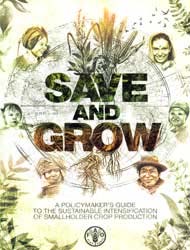
In order to meet projected demand over the next 40 years, farmers in the developing world must double food production, a challenge made even more daunting by the combined effects of climate change and growing competition for land, water and energy. In order to grow, agriculture must learn to save.
The book presents a new paradigm: sustainable crop production intensification (SCPI), which produces more from the same area of land while conserving resources, reducing negative impacts on the environment and enhancing natural capital and the flow of ecosystem services. It presents a rich toolkit of relevant, adoptable and adaptable ecosystem-based practices that enhance crop productivity and can serve as the cornerstone of national and regional programmes.
They include -
- Farming systems: Crop production intensification will be built on farming systems that offer a range of productivity, socio-economic and environmental benefits to producers and to society at large. Conservation agriculture practices are a key component of sustainable intensification, which also requires using good seed of high-yielding adapted varieties, integrated pest management, plant nutrition based on healthy soils, efficient water management, and the integration of crops, pastures, trees and livestock.
- Crops and varieties: Farmers will also need a genetically diverse portfolio of improved crop varieties that are suited to a range of agro-ecosystems and farming practices, and resilient to climate change. Over the past century, about 75 percent of plant genetic resources (PGR) has been lost and a third of today’s diversity could disappear by 2050. Increased support to PGR collection, conservation and utilization is crucial.
- Water management: Sustainable intensification requires smarter, precision technologies for irrigation and farming practices that use ecosystem approaches to conserve water. Knowledge-based precision irrigation that provides reliable and flexible water application, along with deficit irrigation and wastewater-reuse, will be a major platform for sustainable intensification.
- Plant protection: Pesticides kill pests, but also pests’ natural enemies, and their overuse can harm farmers, consumers and the environment. The first line of defense is a healthy agro-ecosystem. In well managed farming systems, crop losses to insects can often be kept to an acceptable minimum by deploying resistant varieties, conserving predators and managing crop nutrient levels to reduce insect reproduction.
The book also explores the policy environment and the institutional arrangements that will facilitate the adoption and implementation of SCPI on a large scale. To encourage smallholders to adopt sustainable crop production intensification, fundamental changes are needed.
Policymakers need to devise incentives for small-scale farmers to use natural resources wisely – for example, through payments for environmental services – and reduce the transaction costs of access to credit, which is urgently needed for investment. Major investment will be needed to rebuild research and technology transfer capacity in developing countries in order to provide farmers with appropriate technologies and to enhance their skills through farmer field schools.
The various chapters of the book can be viewed here –